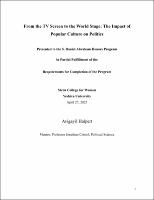Please use this identifier to cite or link to this item:
https://hdl.handle.net/20.500.12202/8996| Title: | From the TV screen to the world stage: The impact of popular culture on politics |
| Authors: | Cristol, Jonathan Halpert, Avigayil |
| Keywords: | Television (Impact) Television broadcasting --Social aspects. politics media and politics The Crown West Wing Derry Girls |
| Issue Date: | 27-Apr-2023 |
| Publisher: | Yeshiva University |
| Citation: | Halpert, A. (2023, April 27). From the TV screen to the world stage: The impact of popular culture on politics [Unpublished undergraduate honors thesis]. Yeshiva University. |
| Series/Report no.: | S. Daniel Abraham Honors Program;April 27, 2023 |
| Abstract: | In this paper I answer the question– How does television impact the American public’s perception of American, English, and Northern Irish politics? To answer this question, I look at three popular television shows, each of which discusses the politics of a distinct country, and analyze the impact that these case studies have on Americans.1 The first show I look at is The West Wing, which influenced how Americans felt about specific real life government policies, impacted how they perceived the role of the presidency, and increased political participation. I then look at The Crown, which served to humanize the royal family for Americans, increased their [perceived] knowledge about English politics and history, and made Americans more interested in English politics. In the third and final section I look at Derry Girls, which greatly increased Americans’ knowledge of “The Troubles” and made them more interested in Northern Irish politics and culture in general. There are only three cases in this paper, but the findings have broad implications and it is highly likely that studies of other cases would yield similar results. I conclude that representations of politics in popular culture make us more engaged and interested in the politics of the time and place represented; and that the real-world impact of these shows can unintentionally (or intentionally) change our level of political awareness, engagement, or knowledge. This impact can be used for good– to combat harmful stereotypes and divisive politics– or can be used for bad– as part of a disinformation campaign. (from Introduction) |
| Description: | Undergraduate honors thesis / Open Access |
| URI: | https://hdl.handle.net/20.500.12202/8996 |
| Appears in Collections: | S. Daniel Abraham Honors Student Theses |
Files in This Item:
| File | Description | Size | Format | |
|---|---|---|---|---|
| Avigayil Halpert-Senior Project-2.pdf | 274.56 kB | Adobe PDF |  View/Open |
This item is licensed under a Creative Commons License

